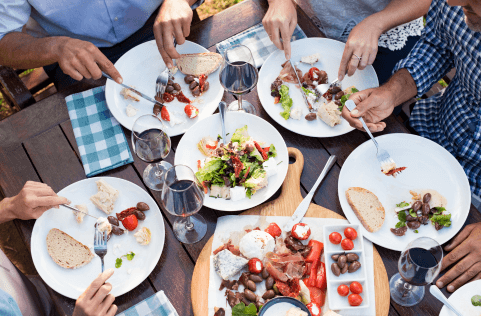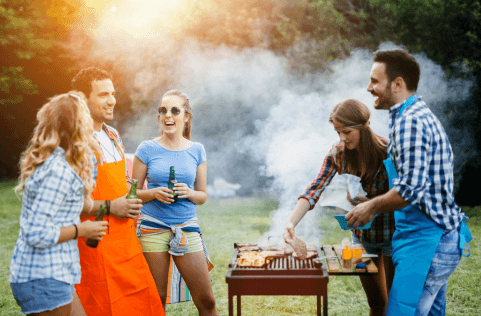While working to heal your relationship with food and body, social eating experiences can be difficult to navigate. From added social pressure, to lack of knowledge or control about food options, there can be several factors about eating socially that make it a challenge.
And while we hear you loud and clear that socially eating can be triggering, it is also a normal part of life and something that is most likely unavoidable. At NourishRX, we strive to support our clients in recognizing that there are ways to approach social eating that can feel good for them! By learning ways to sit with and manage the discomfort that may arise when eating socially, clients are able to truly reclaim parts of their life that disordered eating stole.
As with any type of exposure, our biggest recommendation is you have to practice! And before we can even dive into why practice is important, understanding *why* you are practicing this (aka your “why” for social eating) is step number one.

why is social eating important
Humans have been eating around others for centuries and it has become a main source of connection and community. When dealing with disordered thoughts around food and body, social isolation is a major red flag. While diet culture may have us fearful of the negative side effects of eating out or with others frequently, we would like to talk about some of the documented benefits of social eating and why integrating exposures into your recovery process may be beneficial.
Data actually suggests that those who eat socially more often feel happier and are more satisfied with life, are more trusting of others, are more engaged with their local communities, and have more friends they can depend on for support (1).
In addition, data on overall social isolation and loneliness suggests that social isolation’s adverse health consequences range from sleeplessness to reduced immune function. Loneliness is associated with higher anxiety, depression, and suicide rates. Isolation and loneliness are also linked to poor cardiovascular health and cognitive function (2).
While disordered thoughts may have painted social eating as an “unhealthy option” the research supports that avoiding eating socially may have more adverse effects versus staying home and consuming your safer food options. This type of thinking goes to show how big picture health truly is.
As always, you have the power and agency in your treatment to determine goals moving towards a positive relationship with food. However, if one of those goals is an increase in social eating ability, let’s take a look at ways to engage in these exposures.

how to tackle social eating
treat each experience as an experiment
As you work to include social eating into your treatment plan, you want to start off with more structure before you increase flexibility and spontaneity. This can help you feel more comfortable with the overall experience before you start adding a continued challenge.
When we work with our clients, we recommend they treat each social eating opportunity as an experiment. This allows you to become a neutral observer to the exposure versus attaching emotion to it. Some questions to ask yourself may include:
- What is my hypothesis about this exposure (i.e - how would I like it to go?)
- What skills or techniques would I like to try to achieve this goal?
- What went well? What would I like to bring with me next time?
- What didn’t go well? How can I brainstorm or make a plan for what came up?
Approaching these experiences as experiments puts less pressure on you to “get it right” every time. Remembering, each social eating exposure is going to be different and every time you are able to learn something new.
journal before (and after)
Depending on what the social experiment is, try journaling about the experience before you go. Some prompting questions may include:
- Have you ever had this experience before? If so, what have you previously enjoyed about it?
- What types of foods used to be your favorite?
- Is there anything that you feel excited about trying?
- If this is a new experience: what is there to look forward to?
- What types of foods are typically included at these outings?
- How do these types of foods make you feel?
- Is there something that feels safer vs more challenging?
- Where are you at in your process to challenge yourself?
You can use your journal to talk through the experience and set realistic expectations for yourself. Again, as mentioned above, these might not go as planned and that’s ok! Treat the journaling as an opportunity to work through or jot down some of the anxiety or stress you are experiencing. Getting these thoughts out on paper can be helpful when cognitively working to challenge your intrusive thoughts.
have a nourishment plan
As eating disorder dietitians, we are always talking about having a plan with food! While the social eating experience may be taking up most of your brain space, it’s important to also think about what is going to be happening with food before and after that timeframe. Try to make the day as comfortable and “normal” as possible for you. Avoid having multiple challenges in one day, if this doesn’t feel realistic.
And, above all, ensure that you are consistently nourished going into this social eating experience. The more nourishment you are receiving before, the better you will be able to access your skills and avoid feeling overly panicked.
build a realistic toolbox
We also always encourage clients to realistically think about their skills toolbox and what specific strategies would be feasible during a social eating session.
For example: if you like to calm yourself with a frozen orange when at home, this may not be available at a restaurant. However, could you think about going to the bathroom and splashing cold water on your face, wrist or vagus nerve?
Brainstorm your best coping strategies and then make them realistic for the specific setting. Remember, you don’t have to do this alone! Your treatment team is here to support you in making these skills feel more accessible.
bring your support people!
If possible, bring people who are aware and supportive of your recovery process to these social eating exposures (especially the first few). Feeling comfortable with the people you are eating with can be extremely helpful in building overall comfort with eating socially.
As you get more used to social eating, maybe try challenging yourself by eating in less familiar places or with less familiar people!
have conversations that have nothing to do with food
Remember, the purpose of eating socially is to build connection and community with others! As you start to navigate the social eating waters, think about ways to build that community and connection that has nothing to do with food itself. This could look like:
- Recent hobbies you/they have tried.
- Recent places you/they have traveled. Or, places you have always wanted to travel to.
- Something you/they have read lately and are loving!
- Something you/they have watched lately and can’t get enough!
- Your/Their favorite music right now.
Feel free to add in any topics that feel interesting and fun to the authentic you! This can be a fun activity to also jot down or brainstorm before.
remember your why
As always, when entering new and scary situations, we want to remember our “why”. This is different for every single person, and that’s okay.
We recommend our clients have their “why” visible somewhere: a quote as your phone background, written on your notes app, actually written down - wherever makes sense for you!
While taking steps to be intentionally uncomfortable is hard, you are capable of hard things!

Are you struggling with working social eating into your treatment plan? Or unsure where to start in general with improving your relationship with food?
Our non-diet dietitians want to support you! Whether it’s curating a treatment plan through our insurance-covered 1:1 support, or helping you tackle those real-life goals through our BITES coaching - our team is here.
Drop us a line to see how we can take the first step together!
Resources:
- Dunbar RIM. Breaking Bread: the Functions of Social Eating. Adapt Human Behav Physiol. 2017;3(3):198-211. doi: 10.1007/s40750-017-0061-4. Epub 2017 Mar 11. PMID: 32025474; PMCID: PMC6979515.
- Understanding the Effects of Social Isolation on Mental Health.
Comments Off on How to Tackle Social Eating